Today was one for visiting Norman and Carol in their different parts of London. Jackie drove me to and from New Milton station for the purpose of this trip.
As is often the case, a young woman sat next to me on the train to Waterloo with her huge luggage container effectively blocking two seats opposite in the crowded carriage. She made no effort to accommodate an elderly couple who squeezed themselves into one and a half seats. A now familiar conversation ensued between me and the newcomers about the lack of adequate storage space on board. Addressing the other passenger, I said: ‘It must be embarrassing for you’. In a quite unconcerned tone she replied: ‘Not really’. With good humour, the gentleman opposite observed that ‘the young today are far more thick skinned than we were’. Smiles all round. ‘Well, you should be’, said I to the young woman. Here the conversation ended.
I took my usual routes to each of my friends’ homes. Much of the Metropolitan Line runs above ground. This means that, in common with the overground railways in the  metropolis, its adjacent buildings are decorated with graffiti, like this example photographed from the platform at Preston Road. Some would find this, in its own way, equally as artistic as the work of Banksy, although it commands neither the admiration nor the high prices of his efforts.
metropolis, its adjacent buildings are decorated with graffiti, like this example photographed from the platform at Preston Road. Some would find this, in its own way, equally as artistic as the work of Banksy, although it commands neither the admiration nor the high prices of his efforts.
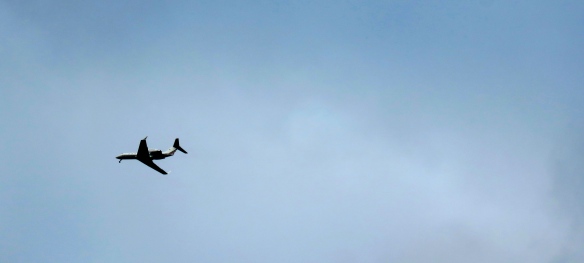 As always, a plane thundering over the recreation ground on the way to Norman’s reminded me that this area is on a flight path from Heathrow.
As always, a plane thundering over the recreation ground on the way to Norman’s reminded me that this area is on a flight path from Heathrow.
Norman provided us with a lunch of what he called a salmon and prawn ‘concoction’ with savoury rice, followed by Christmas pudding and well-laced custard. We shared a bottle of Italian white Triade, 2012.
As I left Westminster underground station en route to Carol’s, traffic around Parliament 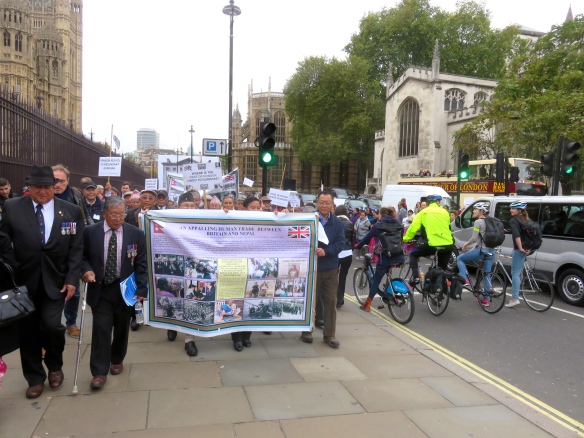
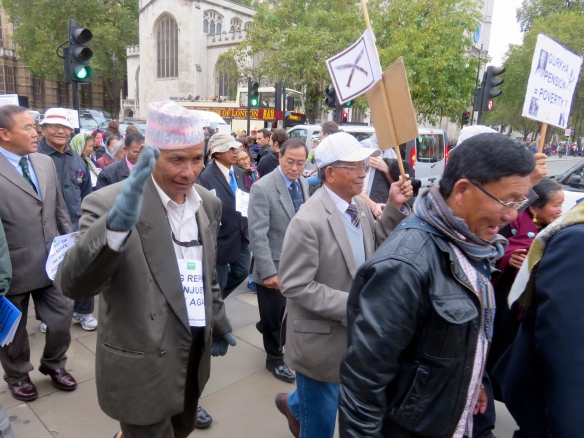
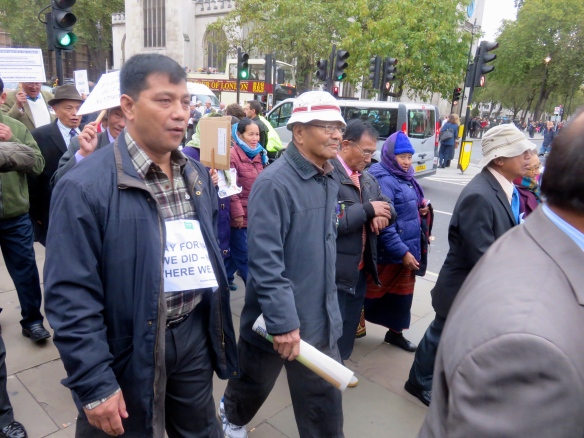


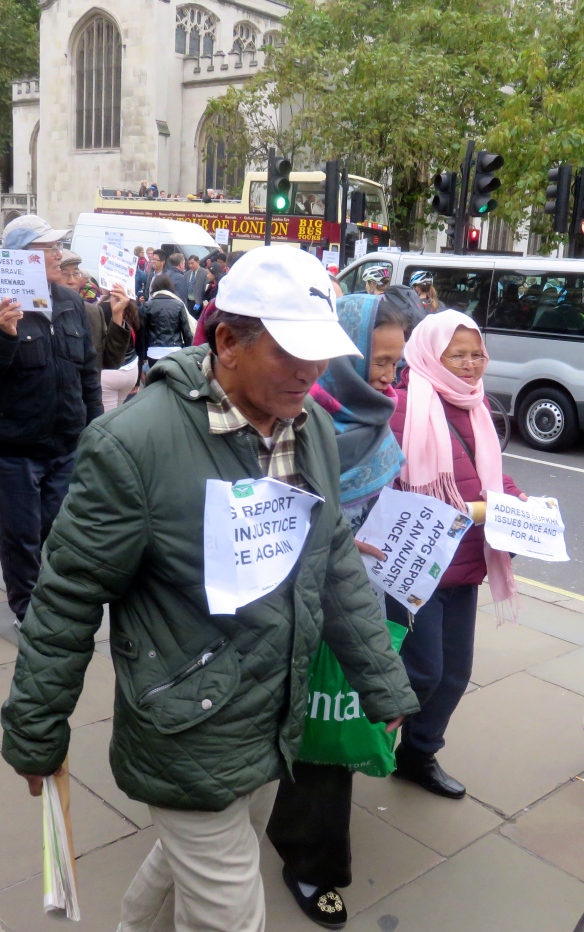
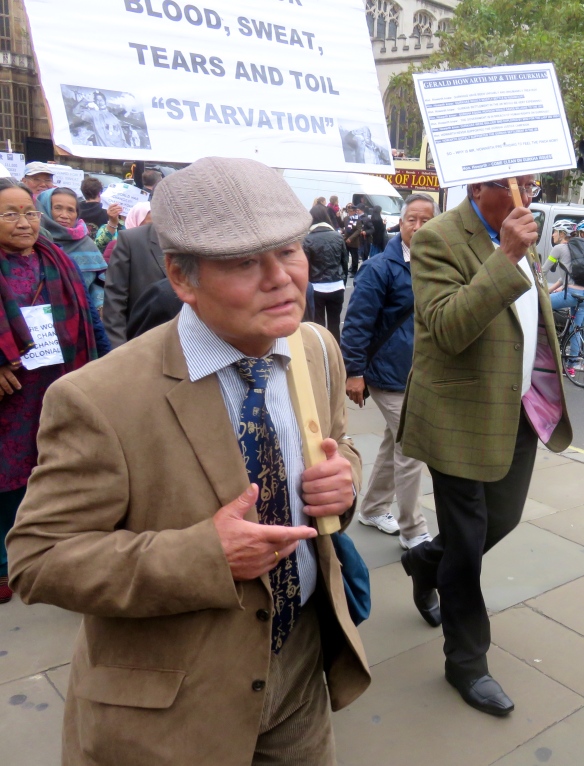

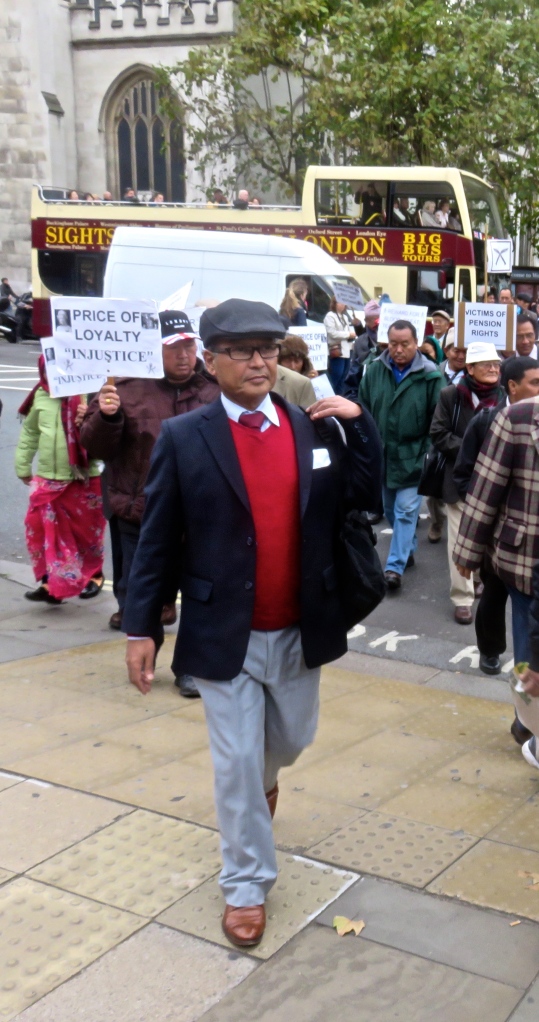 Square was somewhat disrupted by a dignified and silent demonstration by retired Gurkhas and their families. A recent government report has disappointed them in their quest for adequate pensions.
Square was somewhat disrupted by a dignified and silent demonstration by retired Gurkhas and their families. A recent government report has disappointed them in their quest for adequate pensions.
There follows the text of a report by Yahoo! news:
‘About 300 former Gurkha soldiers and their relatives protested outside Britain’s parliament on Thursday to demand better pensions, after rejecting an official report they had hoped would address their grievances.
Many of the veterans — Nepalese soldiers who served with the British army — had invested high hopes in the parliamentary inquiry launched last year into decades of alleged discrimination at the hands of the British government.
But the report proved a bitter disappointment for the veterans and hundreds gathered outside the Houses of Parliament in protest, holding up placards saying: “Price of loyalty — injustice” and “Gurkha pension rights”.
“It has taken over 20 years of campaigning to get to this stage, and we thought this would be an opportunity to put an end to the Gurkha grievances once and for all,” said Deepak Maskey, a spokesman for the Gurkha Satyagraha campaign.
“But that has not happened.”
One veteran, Gyanraj Rai, said he might have to resume a two-week hunger strike he carried out last year, which only ended with the launch of the inquiry by the All-Party Parliamentary Group (APPG) on Gurkha rights.
“We want the value of our blood and tears. We want to be treated as our British counterparts,” the 56-year-old, who served 19 years with the British army, told AFP.
Afterwards many of the protesters, the men wearing suits and the women wrapped in brightly coloured scarves, took their message to Prime Minister David Cameron with a demonstration outside Downing Street.
The Gurkhas are renowned for their ferocity, loyalty, bravery and razor-sharp kukri fighting knives. They first served as part of the Indian army in British-run India in 1815 and around 2,700 are currently enlisted.
But it is only since 2007 that they have had the same pay and conditions as British soldiers, and campaigners have been demanding rights for veterans and their families, many of whom they say have been left in poverty.
One of the key issues was the income of almost 21,000 veterans on the Gurkha Pension Scheme, but the parliamentary report did not make any recommendations, citing ongoing legal action.
Instead, it focused on issues it said were more clear-cut, such as the policy to discharge any Gurkhas who married outside Nepalese society.
This was “racism pure and simple”, the lawmakers said, saying any Gurkha who wished to pursue legal action should be given British state funds to fight their case.
APPG chairwoman Jackie Doyle-Price, a lawmaker with Cameron’s Conservative party, acknowledged the Gurkhas’ disappointment at her report.
She stressed that her group only had the power to advise, not compel, the government, but said it was only a “staging post on the journey — it’s not the end of it”.’
Further on, down Victoria Street, a bus was mounted on the pavement. 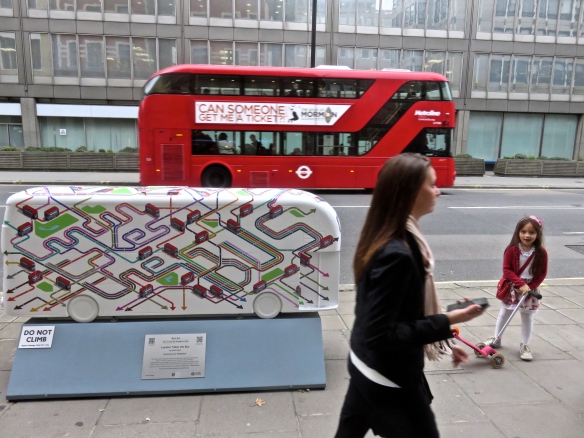 This, apparently, is the year of the bus. Scattered around the capital are sculptures of these vehicles which will eventually be sold in support of charities. Themes that have been used in the past have included cows, and elephants which Jackie and I took Flo to see about five years ago. This involved obtaining a list of the exhibits and tracking down as many as we could. Today, Amy, on her scooter was carrying out a similar tour with her father.
This, apparently, is the year of the bus. Scattered around the capital are sculptures of these vehicles which will eventually be sold in support of charities. Themes that have been used in the past have included cows, and elephants which Jackie and I took Flo to see about five years ago. This involved obtaining a list of the exhibits and tracking down as many as we could. Today, Amy, on her scooter was carrying out a similar tour with her father.